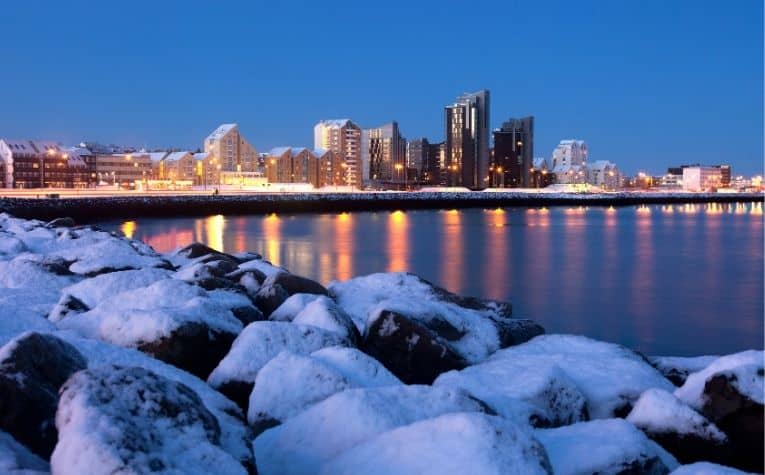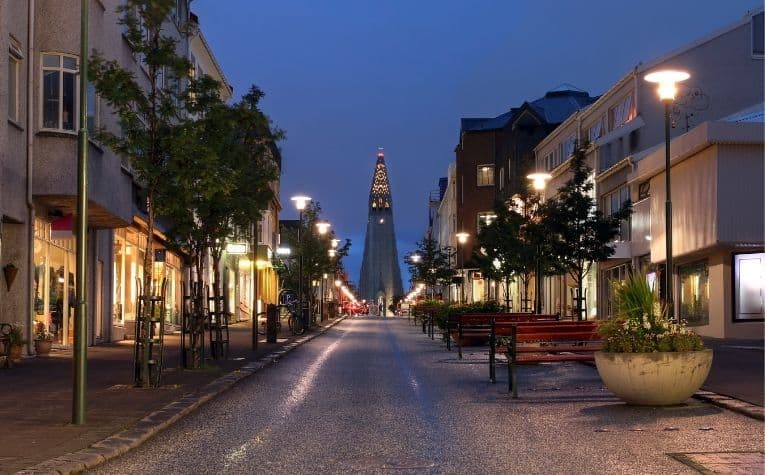Reykjavik is the only true “city” in the country of Iceland, according to the simple definition of the word, which is basically “a large town.”
However, Reykjavik is relatively small when compared to other cities around the world, with a population of just over 120,000 people.
Due to the city’s size, many Icelanders feel safe during the day, but what about at night?
Because Reykjavik has a relatively small population, it is considered one of the safest places to visit, especially at night.
According to data from 2020, Reykjavik only had a 22.22% crime rate (per every 100,000 residents), ranking it as one of the safest capital cities in the world.
Below are additional statistics and other reasons why Reykjavik, Iceland is such a safe place to live and visit, even at night.
Taking a trip to Iceland? See Can You Get to Iceland Without Flying? to learn more.

How Safe is Reykjavik at Night?
To better understand exactly how safe Iceland’s capital city of Reykjavik is, consider these statistics [1]:
- General Crime Rates – Overall, Iceland reported 60,242 crimes.
- Violent Crimes – Only 30 of the 60,242 crimes reported were “violent crimes.” Homicide numbers are in the single digits.
- Sexual Assault/Rape – There were 78 instances of rape reported for the year in Iceland. (For comparison, in the U.S. 85,000 rapes were reported.)
- Narcotics – Drug use in Iceland is low as well. Cannabis use is at 3.4%. Opiate use measures at .3%, which is the lowest in the world.
Exactly how close are Iceland and Greenland? See Can You See Greenland from Iceland? to learn more.
Reykjavik Crime Rates
Reykjavik has seen an increase in tourists, so there has also been an increase in petty crime, including domestic assaults, vehicle thefts, and pick-pocketing.
However, the rise of these crimes is still very low when compared to those same crimes being committed in the US, and the city overall is considered one of the top safest capital cities in the world. [2]

Why is Reykjavik so Safe?
There are many reasons why the city of Reykjavik is so safe [3]:
Sociological Standards
Iceland is a country with a zero-class system, meaning that all residents essentially identify themselves as middle class.
In other countries that have a class system, such as the US, people are more likely to feel unequal to one another, which often leads to higher crime rates between classes.
In addition, Iceland is considered the number one country in Europe when it comes to effective social equality reform.
All citizens, regardless of their nationality, sex, race, or any other identifying trait, are treated equally.
Most Icelanders take discrimination very seriously and look down on it; any reports of discrimination are addressed quickly.
Technological Advancements
There have been a few technological advancements that allow Reykjavik, and the country of Iceland as a whole, to remain safe for its citizens and tourists.
For example, in 2017, Iceland’s government began installing more CCTV cameras in Reykjavik.
The cameras are monitored by the police and have helped in keeping crime low.
In addition, to reduce crime, Iceland’s government developed a smartphone app that will allow people to contact the central emergency response center directly.
The app is called “112 Iceland.” Dialing the 112 code on the app will immediately connect you to the emergency response center.
Overall, the app allows a reduction in response time for search and rescue operations as well as police response to an incident.
Iceland’s Police Force
Iceland’s crime is so low that the police officers there do not carry any firearms with them.
The only police unit to carry weapons is a special force of officers called the “Viking Squad.”
Regardless of the lack of firearms, however, the police are very educated, responsive, and well-trained.
They also learn various techniques to help in the de-escalation of incidents and have access to quality technology to aid them.
Strict Gun Ownership Policies
Though the police do not carry guns, Iceland itself does have a large number of gun owners.
It is estimated that there are 90,000 guns owned by the people of Iceland.
Most guns owned, though, are used for hunting purposes as opposed to self-defense.
All residents seeking to own a gun in Iceland must go through a rigorous process to purchase one.
They must attend a three-day gun handling course, undergo a complete medical examination, show that they have never had a criminal record, and complete a gun safety test.
Never met an Icelander? See Are Icelanders Friendly People? to learn more.

What Should Visitors Be Concerned About?
Reykjavik is a very safe city; however, there are certain situations in which a person should be more mindful of potential safety hazards. [4]
Downtown Reykjavik
Though the crime rate is low in Reykjavik, in the central downtown area, weekends can become a little rowdy on occasion.
The city of Reykjavik has nightlife known for drinking and can get out of hand at times due to this culture.
Most of the crime in this area is related to a drunken fight or occasional mugging. However, violent crime is still low even during these situations.
Traveling
In Reykjavik, the next primary safety concern should be when it comes to travel in the area. Many roads in the region are made of gravel and are quite pot-holed.
These roads should only be driven on with 4-wheel drive vehicles.
In contrast, Route 1, the main road that encircles the Island, is well maintained and can be traveled easily, so visitors should not drift far from it, especially when planning to rent and drive their own vehicles upon arrival.
It’s also worth noting that the weather in Iceland can change in a second; even in summer months, the weather can change significantly from one minute to the next.
Mountain roads can still be icy in the summer, and a snowstorm can show up out of nowhere at any time.
With the ability of the weather to change so rapidly, it is always necessary to have a charged phone and emergency contact numbers with you.
Although, if possible, the safest alternative way to travel will be by bus.
Hiking
If visitors decide to go hiking on a glacier on the outskirts of the city, they should make sure to have a guide with them.
Guides have the knowledge and equipment necessary to make the event safe.
Glaciers are always moving and can trap people under them if they’re not careful.
If a visitor decides to go somewhere without a guide, they should make sure to follow all the posted signs in the area intended to keep people safe, as well as have all necessary safety equipment, supplies, and a phone.
Safety Tips for Traveling to Reykjavik
As with traveling to any other country a person has not been to before, it is always smart to be aware of new surroundings. Using common sense can go a long way. Use these tips as well:
- Have a charged phone at all times in case of an emergency.
- It is best to tell someone what plans have been made, including an estimated departure time and return time. If a person has not returned by that time, the person with the information can notify the proper authorities for assistance.
- Iceland’s weather can become cold very quickly—even during the summer—so it’s smart to dress appropriately by wearing warm waterproof layers of clothes. Getting caught in freezing weather, while not prepared, can have deadly consequences.
- Since pickpocketing and mugging are more common in the downtown Reykjavik area, it is always best to keep valuables, such as phones, money, and IDs, in pockets. If possible, travel with a group, avoid side streets, and stick to well-lit areas.
Conclusion
Though the city of Reykjavik, Iceland has had a rise in petty crime, it is still considered to be one of the safest cities and countries to visit.
